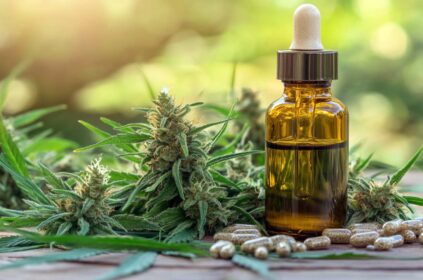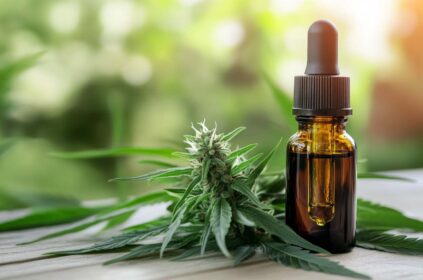Introduction to Delta-8 THC and PTSD Management
In recent years, discussions surrounding mental health treatments have expanded significantly. Among the various avenues being explored, Delta-8 THC has emerged as a noteworthy option for managing symptoms of Post-Traumatic Stress Disorder (PTSD). This article aims to shed light on what Delta-8 THC is, its potential benefits for PTSD, and how it stacks up against other cannabinoids.
Understanding Delta-8 THC requires a dive into its nature and how it can affect mental health. Let’s explore the nuances, applications, and considerations surrounding this unique cannabinoid.
Understanding Delta-8 THC
Delta-8 THC is a cannabinoid derived from hemp and is an isomer of Delta-9 THC, which is the well-known psychoactive compound responsible for the typical “high” associated with cannabis. The primary distinction between the two lies in their effects: Delta-8 is typically less potent and produces a milder high. Some users describe Delta-8 as the “nicer younger sibling” of Delta-9, as it is associated with fewer negative side effects.
How Delta-8 THC Works
Delta-8 THC interacts uniquely with the body’s endocannabinoid system, which plays a vital role in regulating mood, sleep, and stress response through its receptors—CB1 and CB2. While Delta-8 binds to the CB1 receptors, it does so more gently than Delta-9 THC, leading to calming effects that can foster relaxation, emotional stability, and an overall sense of well-being.
Delta-8 THC and PTSD: Potential Benefits
Reducing Anxiety
For individuals suffering from PTSD, anxiety can be a constant and debilitating companion. Delta-8 THC has shown promise in alleviating anxiety levels. A growing body of user reports and anecdotal evidence suggests that this cannabinoid can help moderate stress responses, contributing to a less anxious daily experience. This is particularly significant for PTSD sufferers, who often struggle with overwhelming feelings of unease.
- Real-world Example: A veteran with PTSD shared that using Delta-8 THC reduced his anxiety during social interactions, allowing him to engage more freely without the constant dread he previously felt.
Enhancing Sleep Quality
One of the more common challenges faced by those with PTSD is sleep disturbances. The effects of trauma can lead to insomnia, night terrors, and frequent awakenings. Delta-8 THC may assist in calming the mind and body, thereby improving sleep quality.
- Studies indicate: Many users have reported deeper and more restorative sleep after incorporating Delta-8 into their nightly routine. Enhanced sleep is crucial not just for physical well-being but also for emotional regulation and recovery.
Mood Stabilization
Emotional volatility is another hurdle for many experiencing PTSD. Delta-8 THC may provide valuable support in stabilizing mood by influencing key neurotransmitters linked to emotional health. This stabilization can help manage the fluctuating feelings of sadness or irritability that often accompany PTSD.
Comparing Delta-8 THC with Other Cannabinoids
Delta-8 vs. CBD
Unlike CBD, which is non-psychoactive, Delta-8 THC adds a light psychoactive experience that some users find beneficial. Many people find that Delta-8’s subtle calming effects help to ground them while providing mild euphoria.
- User preference: Some individuals prefer Delta-8 for its combination of therapeutic benefits and mild psychoactive effects, making it a unique choice among cannabinoids.
Delta-8 vs. Delta-9 THC
Delta-8 THC is often described as having a smoother experience compared to Delta-9 THC, with reports of reduced instances of paranoia and anxiety—a common complaint with stronger THC products.
- Users frequently cite that Delta-8 offers a more approachable high, making it suitable for therapeutic use without the heavier side effects of Delta-9.
Choosing the Right Method of Consumption
Delta-8 THC can be consumed in various forms, each offering distinct advantages:
- Edibles: Popular among users for their convenience and longer-lasting effects. Gummies are a favored choice, as they allow for easy dosing.
- Tinctures: Ideal for those seeking precise control over their dosage. They are absorbed quickly, making them effective for prompt relief.
- Vapes: Provide fast-acting effects but should be approached with caution due to potential inhalation risks.
Ultimately, the decision on which method to choose should factor in personal preference and lifestyle.
Incorporating Delta-8 THC into Your Treatment Plan
For those considering Delta-8 THC as part of their PTSD management strategy, it’s essential to treat it as a complement to existing therapies and not a replacement.
- Consultation with a healthcare provider is crucial. A professional can help tailor a treatment plan that aligns with individual needs.
- Continuous assessment should be conducted to gauge how Delta-8 impacts symptoms. Keeping a journal can help track mood changes, sleep patterns, and anxiety levels, facilitating better-informed adjustments.
Legal and Safety Considerations
Understanding the Legal Status
The legality of Delta-8 THC can vary widely by location. It’s essential for users to stay informed about local laws and to purchase Delta-8 products from reputable sources to ensure safety and compliance.
Potential Side Effects
Though Delta-8 THC tends to have fewer side effects than its cousin, Delta-9 THC, it can still produce some adverse reactions, including:
- Paranoia
- Dizziness
- Anxiety
- Confusion
Starting at a low dose and gradually adjusting is the best approach to minimize risks.
Real-World Experiences and Research
Numerous studies and user anecdotes underline the positive impacts of Delta-8 THC in managing PTSD symptoms. For example, a review of participants using Delta-8 found that 70% reported significant reductions in anxiety and stress levels, along with improved overall well-being. Such findings underscore the potential of Delta-8 THC as a therapeutic option.
Conclusion
Delta-8 THC stands as a promising alternative for the management of PTSD symptoms. With its potential benefits in reducing anxiety, enhancing sleep quality, and stabilizing mood, it offers a new pathway for those seeking relief. However, it’s vital to approach its use with caution and under professional guidance to ensure safe and effective integration into treatment plans.
Actionable Tips
- Consult with a healthcare professional to customize your approach to using Delta-8 THC.
- Begin with low doses and carefully monitor how your body reacts.
- Choose a consumption method that fits seamlessly into your daily routine.
- Keep track of your experiences to help adjust usage as necessary.
Incorporating Delta-8 THC into a comprehensive treatment strategy may offer individuals with PTSD a beacon of hope, supporting their journey towards improved well-being and quality of life.
For further information and insights on Delta-8 THC and its potential benefits, explore more resources in the field of cannabinoid research and mental health management.




















